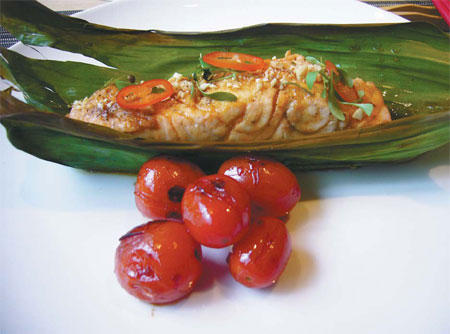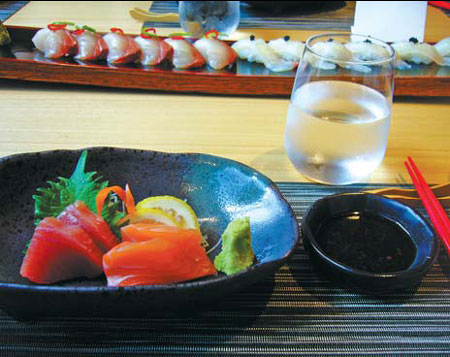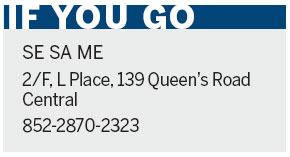Japanese Plus
Updated: 2012-04-01 08:17
By Donna Mah (China Daily)
|
|||||||||||
|
The salmon in banana leaf with Vietnamese caramel is colorful on the plate and served rare in the middle. [Photos by Donna Mah / for China Daily] |
|
Traditional sushi and sashimi made by executive sous chef Shinji Tomori. |
|
|
Hoshuin-style sushi sets apart the kitchen of a 'Sushi Monk', reports Donna Mah in Hong Kong.
It's new and it looks set to be one of the new and trendy places to dine in the L Place building on Queen's Road Central.
Located on the second floor of the same building that houses Shore and Shore Steak, Se Sa Me is decked out in blond wood and darker colored accents with lots of natural lighting.
They serve "Japanasian" food here with Japanese executive sous chef Shinji Tomori, known as the "Sushi Monk", specializing in preparing traditional sushi and sashimi for diners.
Chef Tomori is one of only 42 chefs in Japan to be accredited in the Hoshuin traditional style of sushi. The kitchen at Se Sa Me opened under executive chef, "Food Buddha" Rodelio Aglibot, who was the opening executive chef at Koi Restaurant in Los Angeles.
Executive chef Dominic South joins Se Sa Me from many years working in some of London's best hotels and restaurants, including Nobu London. The menu at Se Sa Me is heavily influenced by Japanese cooking with infusions of other Asian flavors.
We sampled an array of fresh sushi and sashimi, as well as the Hawaiian-inspired poke (poh-kay), which is a raw fish chopped salad.
The poke at Se Sa Me is served with crispy lotus root chips which added a nice texture contrast to the tangy salmon poke and beef poke we nibbled on. They were a very refreshing and tasty way to start our meal.
The crispy baby bok choi leaves served with tomato-ginger dressing and togarashi (Japanese chili powder) and sweet corn crunch with scallions and nuoc cham (Vietnamese mixed fish sauce) were a nice contrast to the poke. Both were crispy and served with sauces with very distinctive flavors.
The sushi and sashimi were very fresh and the cuts of fish generous, but not too thick.
Served with the fish was fresh-grated wasabi which tastes slightly sweet as well as offering the wasabi "kick". Fresh-grated wasabi tastes much better than the toothpaste tube wasabi that many of us are all too familiar with.
As a main course, we had a choice of salmon in banana leaf or black pepper lime chicken.
The salmon in banana leaf with Vietnamese caramel is colorful on the plate and served rare in the middle. Most of my fellow diners selected this as their main course, but the black pepper lime chicken turned out to be the more interesting dish.
The black-pepper lime chicken is what I'll call a "fusion" dish.
The chicken looked very much like a dish you would get at a southern Chinese-style barbeque meats restaurant, but when you tasted the chicken, you knew that this was definitely not prepared the same way.
The flavors and textures made this a very unexpectedly delightful dish with the tangy citrus topping of ginger, green onion, and lime juice being a wonderful accompaniment to the tender chicken.
For dessert, we had the pineapple and pandan cheesecake with ginger biscuit. It was light and not overly sweet, but for me, I could take or leave this.
Expect to spend HK$500-800 ($65-105) per person (plus 10 percent service charge) for dinner.
Contact the writer at sundayed@chinadaily.com.cn.
Today's Top News
Rescuers race against time for quake victims
Telecom workers restore links
Coal mine blast kills 18 in Jilin
Intl scholarship puts China on the map
More bird flu patients discharged
Gold loses sheen, but still a safe bet
US 'turns blind eye to human rights'
Telecom workers restore links
Hot Topics
Lunar probe , China growth forecasts, Emission rules get tougher, China seen through 'colored lens', International board,
Editor's Picks

|

|

|

|

|

|








